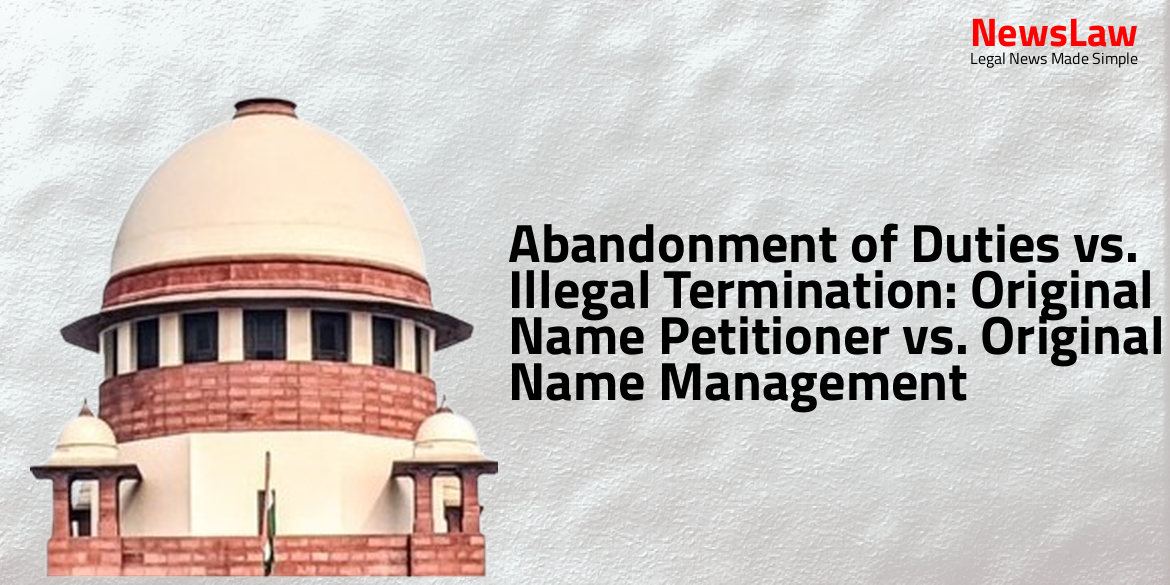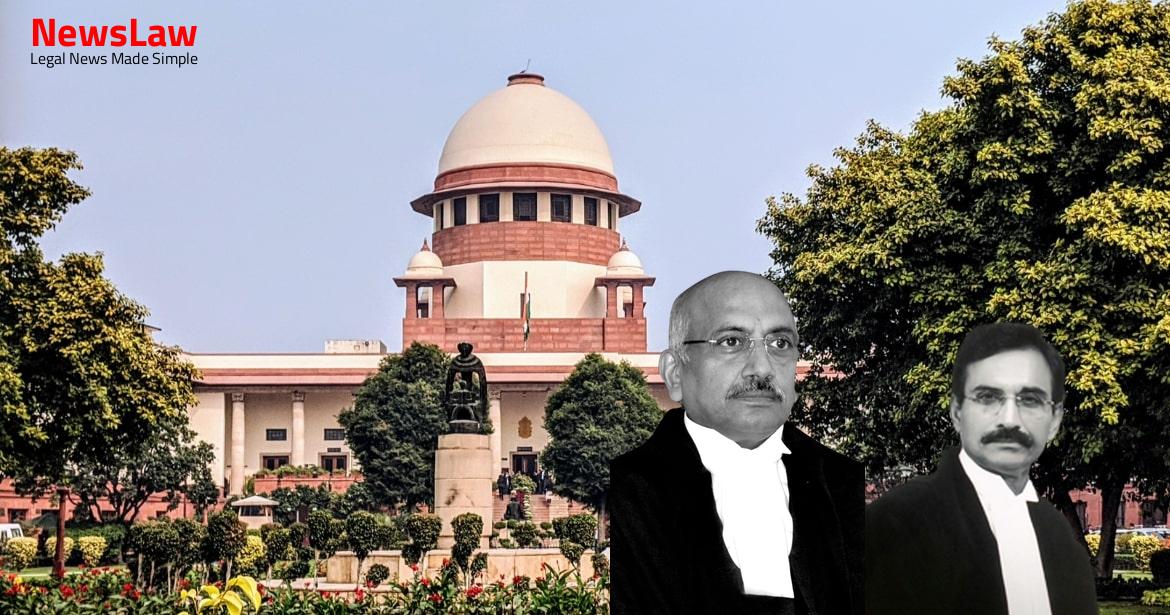In a significant ruling, the Delhi High Court adjudicated on the case of Original Name Petitioner against Original Name Management, focusing on the contentious issues of abandonment of duties and allegations of illegal termination. The court’s decision sheds light on crucial aspects of labor laws and employee rights. Stay informed about this impactful legal battle in the realm of employment law.
Facts
- Petitioner joined the organization as Sample Tailor on 19 February, 2002.
- Petitioner requested benefits like legal facilities, double overtime, leave, etc., which were denied by the management.
- Petitioner was illegally terminated on 8 December, 2008, without notice or a domestic enquiry.
- Labour Inspector’s report stated petitioner was not reinstated and no settlement was reached.
- Petitioner filed a case seeking benefits before Labour Conciliation Officer, later transferred to Labour Court on 1 October, 2008.
- Management tried to pressurize petitioner to withdraw the case.
- Petitioner sent a legal notice regarding illegal termination on 15 December, 2008, with no reply.
- Complaint filed before Assistant Labour Commissioner where earned wages were given but not reinstated.
- Another industrial dispute raised seeking reinstatement (LID no. 726/2016).
- Petitioner approached the Court seeking to quash the award dated 7 September, 2018.
- Judgment was based on the fact that the management did not terminate services but the workmen abandoned their jobs.
- The industrial dispute for reinstatement was rejected by the Labour Court in the impugned award dated 7 September, 2018.
Issue
- The issue in question is whether the workman was terminated illegally and/or unjustifiably by the management.
- Another aspect of the issue is whether the workman abandoned his duties from December 2008 by remaining absent without authorization.
Arguments
- Petitioner was offered a meagre monetary settlement by the respondent which was not acceptable, indicating acknowledgment of wrong committed by respondent.
- Labour Court overlooked the fact that petitioner tried to report for duty but was not allowed by the respondent.
- Letters from management to petitioner were not sent directly, but to the Union instead.
- Impugned award passed erroneously, ignoring petitioner’s illegal termination and refusal by respondent to allow rejoining.
- Lack of consideration of essential facts by the Labour Court, resulting in arbitrary decision in the award.
- Judgement violates petitioner’s rights under Article 14, 19, and 21 of the Constitution of India.
- The impact of termination not easily quantifiable, affecting not just the employee but the entire family.
- Inconsistencies in Labour Inspector’s report raise doubts on the case presented by the respondent.
- Original Name never terminated services of Original name Petitioner, who abandoned duties himself.
- During cross-examination, Original Name Petitioner admitted receiving labor welfare benefits as per law and never complained about benefits.
- Original Name Petitioner admitted to not having documents to prove overtime work.
- Original Name Petitioner never instructed the Union to file a general demand case.
- Original Name Petitioner was called to rejoin duties multiple times by Original Name Management.
- Management sent reminders to Original Name Petitioner about unauthorized absence and urged him to rejoin within 48 hours.
- Management warned of possible disciplinary action if Original Name Petitioner did not return to work.
Analysis
- The Division Bench of Bombay High Court clarified the concept of abandonment of service, stating that it is a result of unilateral action by the employee.
- In cases of abandonment, the employer must issue a notice to the employee to resume duty and conduct an inquiry before termination.
- Allegations of abandonment must be substantiated by the employer’s proof along with the employee’s intention to abandon services.
- The Hon’ble Supreme Court emphasized that intervention in factual findings can only occur if the award is perverse or based on wrong legal principles.
- The Division Bench of Kerala High Court defined abandonment of services as a voluntary and permanent act of leaving the job without intending to return.
- The absence from duty without notification for a long period can result in termination due to abandonment of service.
- The workman’s approach to the Labour Officer with grievances indicates intent to rejoin, casting doubts on claims of abandonment.
- The Supreme Court has ruled that prolonged absence from duty may constitute voluntary abandonment, leading to termination.
- Illegal terminations motivated by resistance to wage revisions can amount to unfair labor practices.
- The legal precedent suggests that prolonged absence from duty can lead to resignation from service.
- The High Court observed that an illegally terminated workman typically deserves full back wages, barring any gainful employment during the period of unemployment.
- The respondent management made repeated efforts to call the claimant back to work after unauthorized absence.
- The claimant admitted to receiving letters urging him to return to work but failed to do so.
- The claimant never filed any written complaint to labor authorities about not being allowed to return to work.
- The respondent presented evidence that the claimant’s name still appeared on the muster roll, indicating he was not terminated.
- The claimant did not have any evidence to support his claim of working overtime or being entitled to double overtime pay.
- The claimant admitted to being offered the opportunity to return to work by the management but did not take it.
- The management’s actions were found to be in accordance with labor laws and no illegal termination was established.
- The court concluded that the claimant had abandoned his duties by remaining absent without authorization.
- The claimant’s claims of termination and lack of compensation were dismissed based on evidence and testimonies presented during the trial.
- The court found no grounds for interference in the decision of the labor court, as the evidence supported the dismissal of the claim.
- The Court upholds the impugned award dated 7 September, 2018 passed by the Labour Court – IX, Dwarka Courts, Delhi.
- There is no merit found to interfere with the findings of the Labour Court.
- The individual petitioners were found to have abandoned their services, and allegations of illegal termination were rejected by the Labour Court.
- The petitioners in this batch of petitions have failed to present any propositions to establish their case.
Decision
- The impugned award in each of the connected petitions is upheld by the Court.
- The batch of petitions is dismissed.
- Any pending applications also stand dismissed.
Case Title: RAMA SHANKAR Vs. AT HOME INDIA PVT. LTD. AND ANR. (2024:DHC:3790)
Case Number: W.P.(C)-1585/2019



